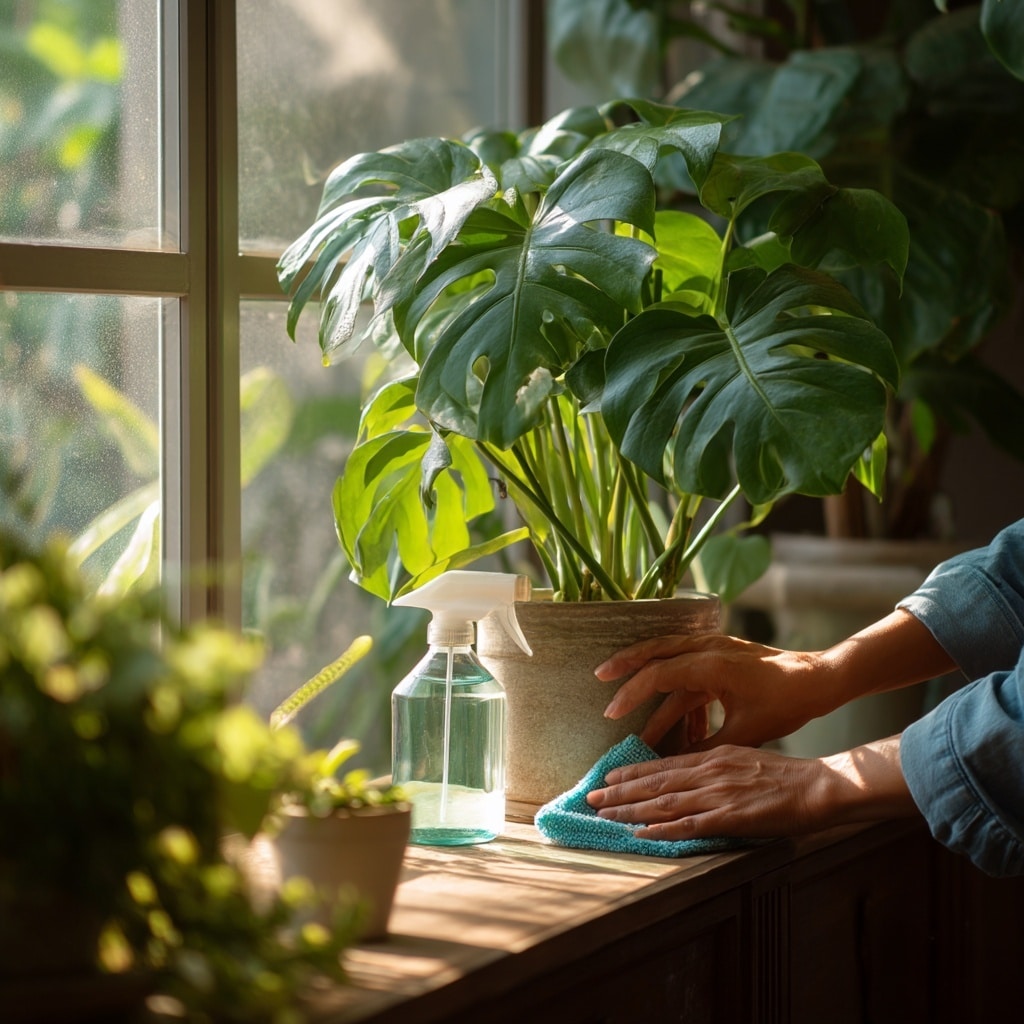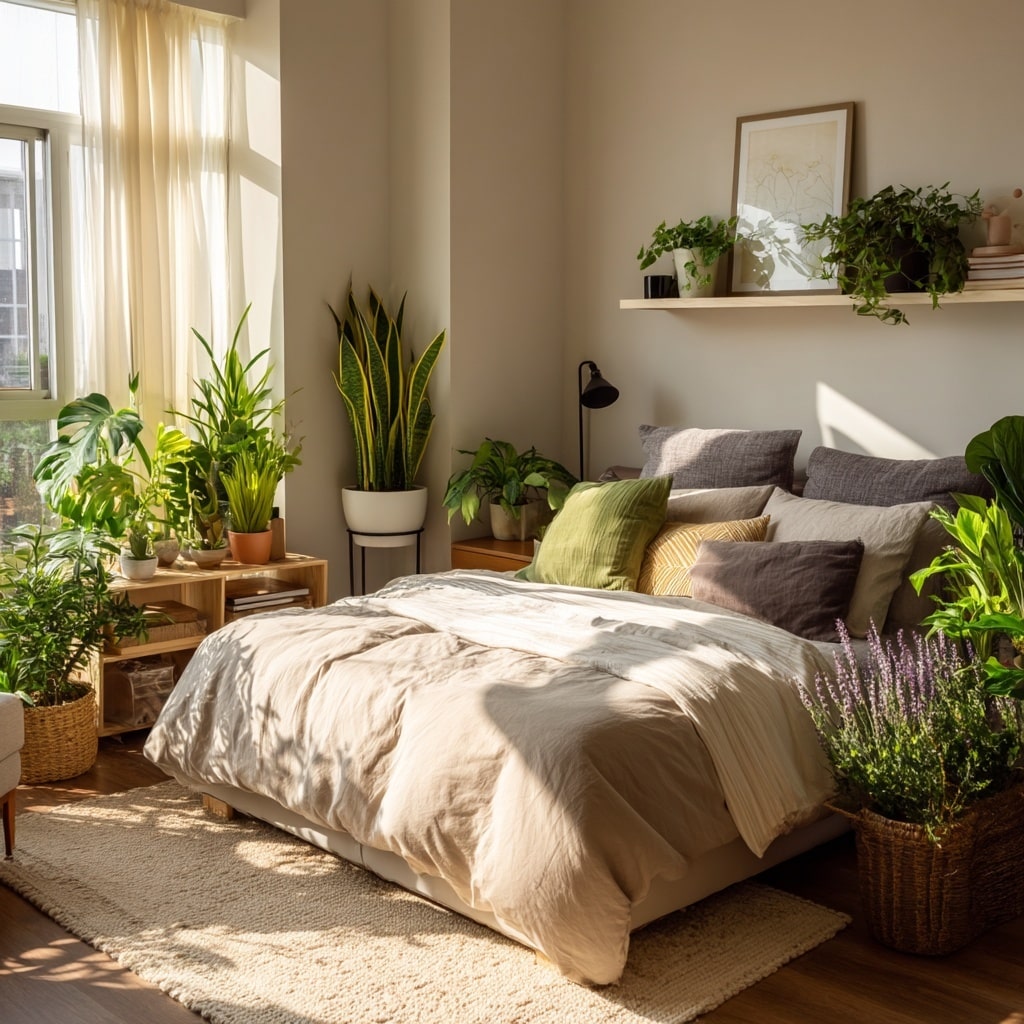Plants can do more than just beautify your space — they bring life, purify the air, and even uplift your mood. Whether you’re styling a cozy bedroom nook or refreshing your living room, adding the right indoor plants creates a calming, welcoming environment. With countless varieties to choose from, selecting plants that thrive indoors while complementing your decor can feel overwhelming. But don’t worry — we’re here to help you find easy-to-care-for, stylish green companions that suit both your bedroom and living room needs. From low-light lovers to air-purifying champions, we’ll cover smart indoor plant ideas that work beautifully across your home.
Table of Contents
Benefits of Indoor Plants in the Bedroom and Living Room
Adding plants to your bedroom and living room isn’t just an aesthetic choice — it’s a lifestyle upgrade. These green companions offer a range of physical and emotional benefits that enhance daily living in quiet, subtle ways.
1. Improve Air Quality
Many indoor plants act as natural air filters, absorbing pollutants like benzene, formaldehyde, and carbon monoxide. Peace lilies, snake plants, and spider plants are known for their air-purifying properties, making them perfect for bedrooms where clean air supports restful sleep.
2. Promote Better Sleep
Some plants release oxygen at night and emit calming scents that can help ease stress. Lavender and jasmine, for example, are excellent choices for bedrooms thanks to their soothing aromas and sleep-promoting effects.
3. Reduce Stress and Anxiety
Research shows that simply being around plants can lower stress levels, heart rate, and even blood pressure. Keeping a few pots near your living room seating area can help create a peaceful sanctuary after a long day.
4. Boost Humidity
Indoor plants release moisture into the air through a process called transpiration. This helps maintain healthy humidity levels, especially during dry seasons or in air-conditioned spaces, improving respiratory comfort.
5. Enhance Interior Decor
From trailing ivy on floating shelves to tall fiddle leaf figs in a corner, plants instantly add texture, color, and visual interest. They soften harsh lines, break up empty spaces, and bring nature into modern interiors.
Best Indoor Plants for Bedrooms and Living Rooms
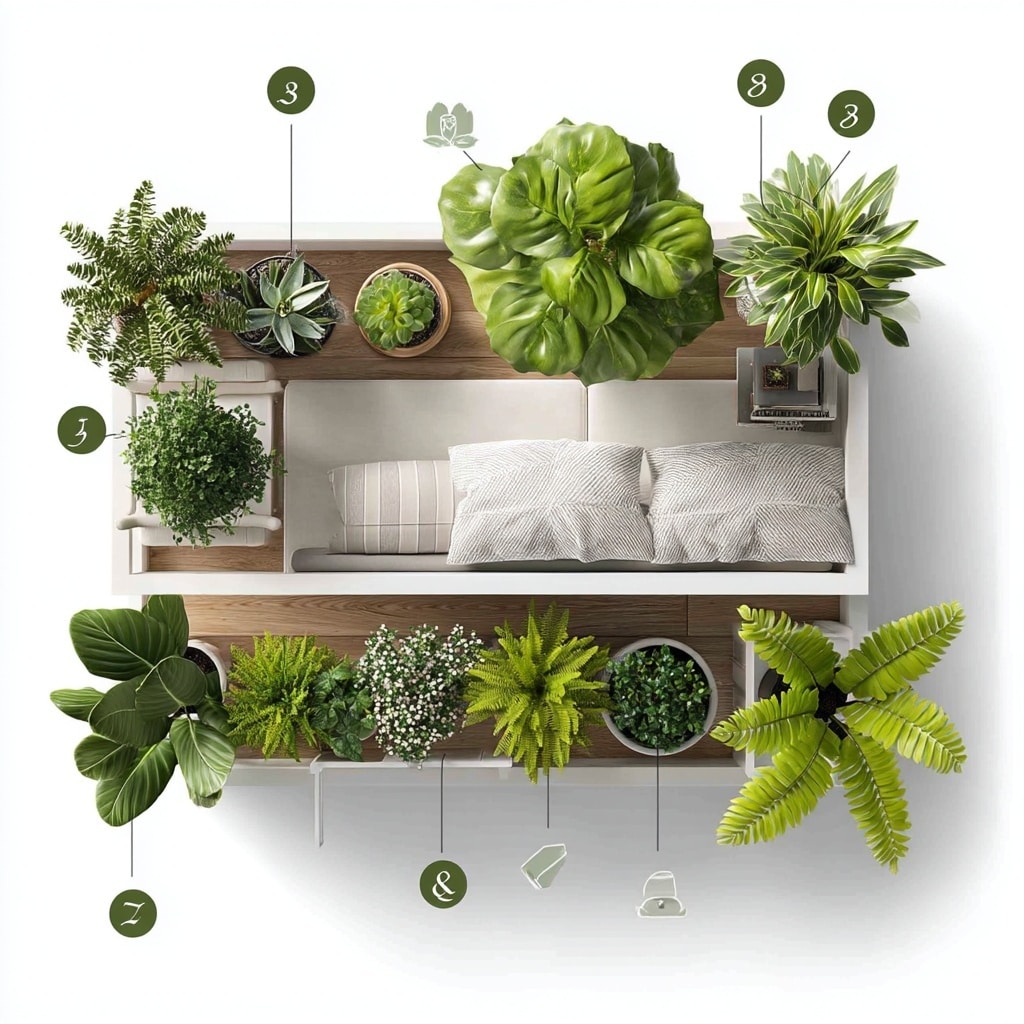
Choosing the right plants for your bedroom and living room comes down to lighting, maintenance, and overall vibe. Below are handpicked suggestions for each space, keeping in mind low-effort care and stylish appeal.
🌙 Best Plants for the Bedroom
Bedrooms benefit from soft greenery that promotes rest, thrives in lower light, and doesn’t demand much care.
1. Snake Plant (Sansevieria)
- Why it works: Releases oxygen at night and filters indoor toxins.
- Care: Extremely low maintenance; tolerates neglect and low light.
2. Peace Lily
- Why it works: Elegant white blooms and excellent air purification.
- Care: Prefers indirect light and moist soil.
3. Lavender
- Why it works: Known for its calming scent, helping with sleep.
- Care: Needs a sunny spot and minimal watering.
4. Pothos
- Why it works: Trailing vines add softness to bedroom spaces.
- Care: Thrives in low light and only needs occasional watering.
5. Aloe Vera
- Why it works: Aesthetic, healing properties, and oxygen production.
- Care: Needs a sunny windowsill and little water.
🛋️ Best Plants for the Living Room
Living rooms offer more space and light, allowing for bolder plant choices that make a visual impact.
1. Fiddle Leaf Fig
- Why it works: Tall, dramatic leaves that make a statement.
- Care: Likes bright, indirect light and consistent watering.
2. Rubber Plant
- Why it works: Glossy leaves and strong vertical growth.
- Care: Prefers filtered light and moist soil.
3. ZZ Plant
- Why it works: Tough, shiny leaves that tolerate neglect.
- Care: Grows well in low light and needs infrequent watering.
4. Monstera Deliciosa
- Why it works: Trendy split leaves and tropical flair.
- Care: Needs bright, indirect light and weekly watering.
5. Boston Fern
- Why it works: Adds texture and helps humidify the room.
- Care: Needs moderate light and frequent misting.
Each of these plants brings its own charm and benefits. Whether you want to create a peaceful retreat in your bedroom or an energizing, lively living room, these options offer the perfect green solution.
Tips for Styling Indoor Plants in Both Spaces
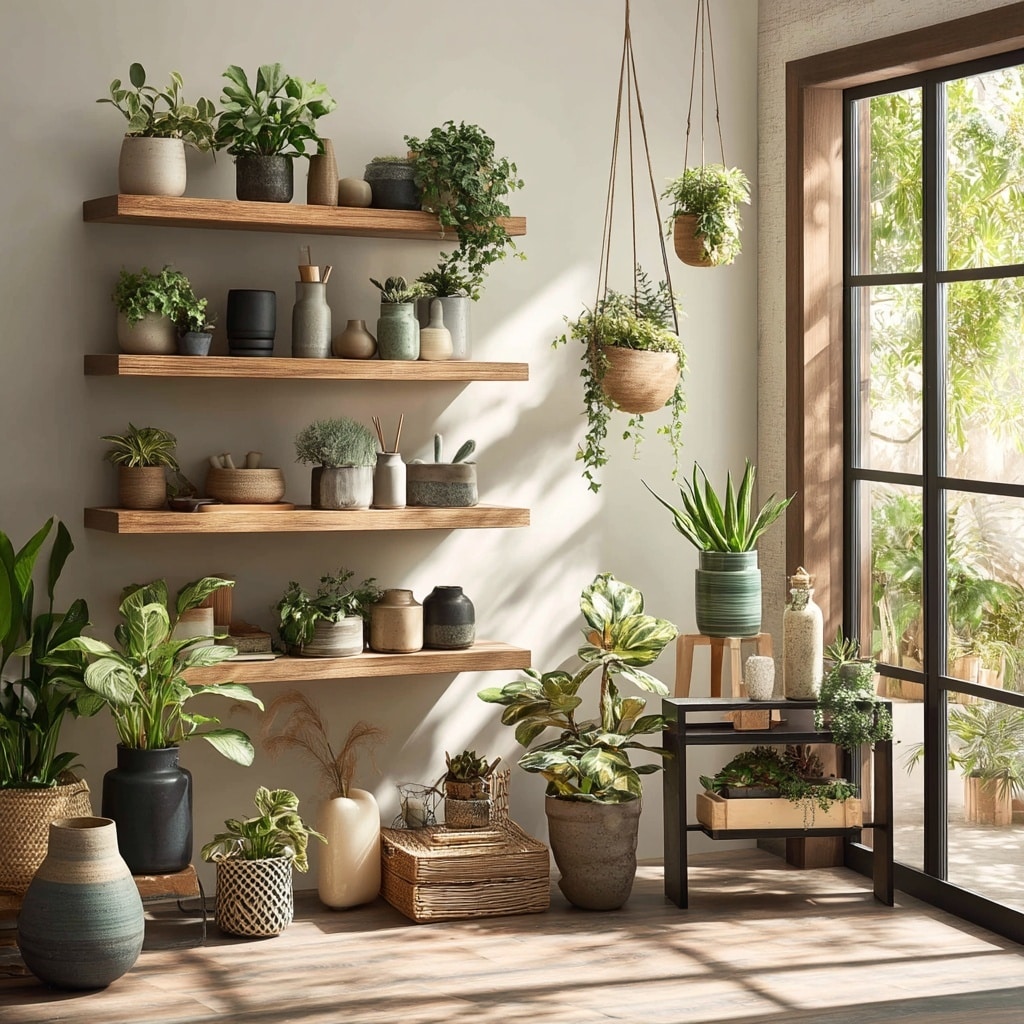
Arranging plants is just as important as choosing the right varieties. How you display them can influence the mood, flow, and overall style of a room. Whether your goal is cozy and calm or vibrant and bold, these tips will help you style your bedroom and living room plants like a pro.
1. Use Plant Stands and Shelves
Don’t just leave your plants on the floor or windowsill. Use tiered plant stands, floating shelves, or ladder racks to create height variation and visual balance. This works especially well in living rooms where design impact matters.
2. Mix Sizes and Shapes
Combine tall plants like fiddle leaf figs with smaller potted varieties like succulents or peace lilies. Mixing leaf textures and heights adds interest without overwhelming the space.
3. Group by Lighting Needs
Keep plants with similar light requirements together. This makes caring for them easier and ensures they thrive in their shared environment.
4. Make Use of Corners
Empty corners are perfect spots for large plants. A rubber plant or monstera placed in a well-lit corner of the living room can instantly fill space and soften the lines of the room.
5. Use Hanging Planters
Free up floor space with ceiling-mounted or wall-hung planters. Ideal for pothos, ivy, or spider plants, these options add greenery without cluttering furniture surfaces.
6. Complement Your Decor
Choose pots and planters that match your existing interior style. Minimalist white ceramics, rustic terracotta, or even woven baskets can help your plants blend into your design scheme.
7. Avoid Overcrowding
Less is often more. Be selective with placement to maintain a clean, calm feel — especially important in bedrooms where clutter can disrupt relaxation.
Care Tips to Keep Your Indoor Plants Thriving
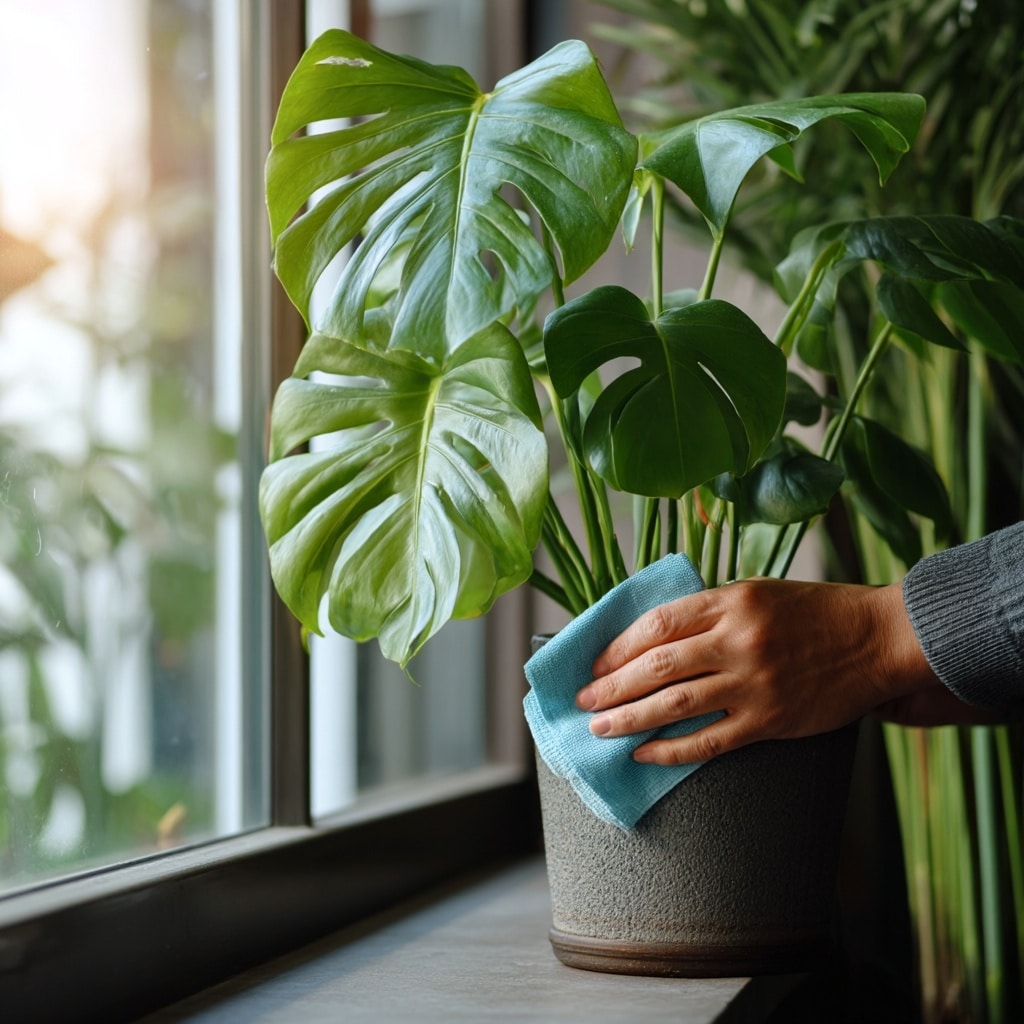
Once you’ve chosen and styled your plants, the key to keeping them vibrant and healthy lies in consistent care. Luckily, most indoor varieties are low-maintenance — you just need to follow a few golden rules.
1. Know Your Light
Understanding your home’s natural lighting is crucial. Place low-light plants like ZZ plants or snake plants in dimmer corners, and reserve sunny spots for sun-loving options like aloe vera or lavender.
2. Avoid Overwatering
One of the most common plant care mistakes is watering too often. Always check soil moisture before watering. Many indoor plants prefer to dry out slightly between waterings.
3. Clean the Leaves
Dust can block sunlight and reduce photosynthesis. Wipe leaves gently with a damp cloth every few weeks to keep your plants breathing and shining.
4. Rotate for Even Growth
If your plants lean toward the light, rotate them every couple of weeks to encourage even growth and prevent them from becoming lopsided.
5. Watch for Pests
Keep an eye out for tiny insects like spider mites or fungus gnats. If you notice signs like discolored leaves or webbing, isolate the plant and treat it with neem oil or insecticidal soap.
6. Fertilize Sparingly
Indoor plants do need nutrients, but not too often. Use a diluted, balanced fertilizer once a month during growing season (spring and summer), and skip feeding during dormancy (fall and winter).
7. Repot When Needed
If your plant becomes root-bound or outgrows its pot, repotting is necessary. Choose a pot that’s 1–2 inches wider, and refresh the soil to give your plant new life.
Conclusion
Adding plants to your bedroom and living room is one of the easiest ways to breathe life, color, and calm into your home. From the health benefits to the aesthetic charm, the right indoor plants can elevate your space without requiring much effort. Whether you prefer low-light leafy greens or bold, sculptural varieties, there’s a perfect plant for every room and every lifestyle. With the right care and thoughtful placement, your indoor greenery will not only thrive — it will transform your home into a more peaceful, inviting space.

